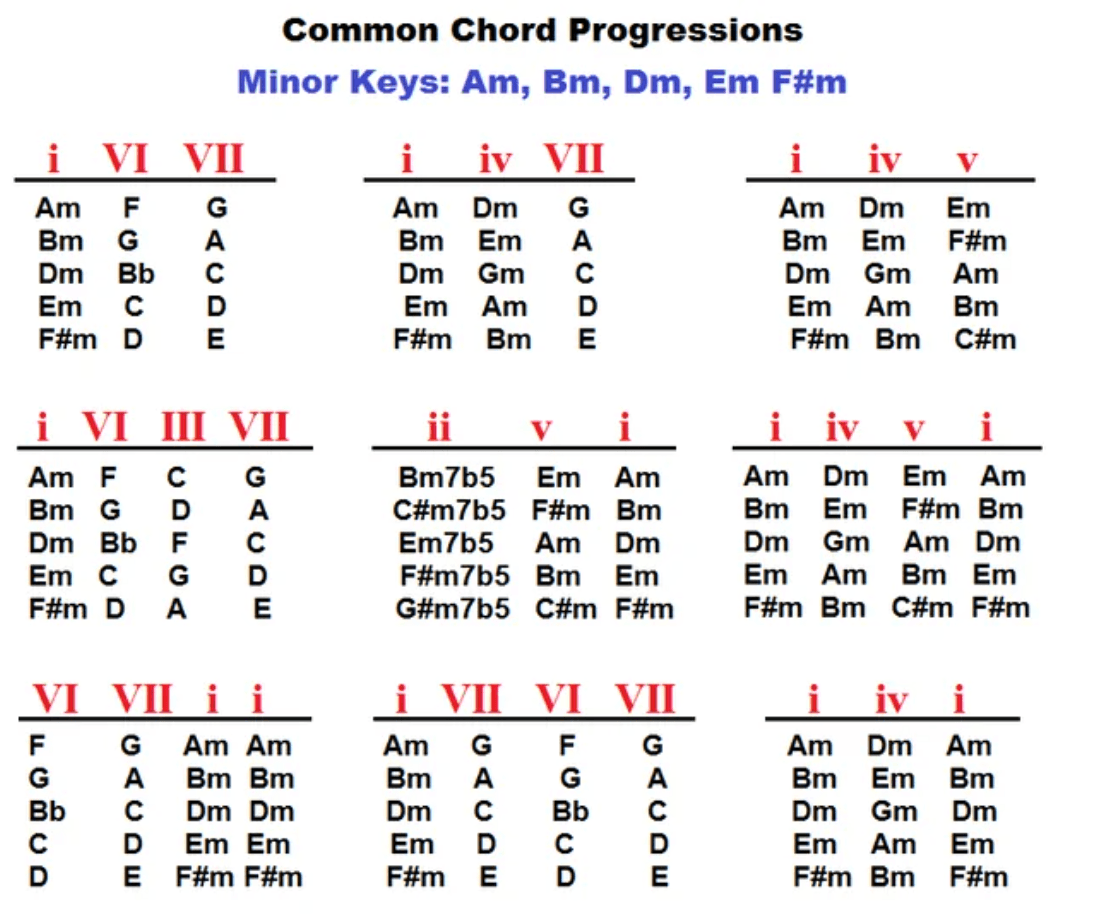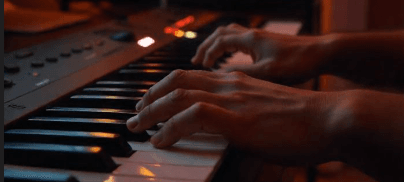AI chord generators are not just futuristic tools; they're here, transforming how we create music.
Imagine a world where the complexity of chord progressions is simplified, where inspiration is a click away.
That's the reality AI brings to music creation. Dive in to discover how these tools are not replacing, but enhancing the musical journey.

Understanding the Magic of Chords in Music
Embarking on a journey to explore the essence of music, we delve into the enchanting world of chords.
These harmonious combinations of notes form the backbone of melodies, lending emotion and depth to every musical composition.
In this section, we unravel the magic of chords in music, shedding light on their significance, types, and the role they play in crafting unforgettable musical experiences.
The Essence of Chords in Music
Chords, essentially groups of notes played simultaneously, are fundamental in shaping a song's emotional landscape. They provide the harmonic foundation that supports melodies and rhythms, creating a full, rich sound.
A chord's quality, whether major, minor, diminished, or augmented, directly influences the mood of a piece, evoking feelings ranging from joy to sadness, tension to resolution.
Crafting Captivating Chord Progressions
A captivating chord progression is more than a sequence of chords; it's a musical journey. The magic lies in how these chords are arranged and progress from one to the next.
This progression determines the narrative flow of the music, leading listeners through a spectrum of emotions.
The use of unexpected chord changes, or modulations, can particularly intrigue and surprise an audience, keeping them engaged and emotionally invested.
Integrating Rhythm and Harmony
In addition to the chords themselves, the rhythm with which they are played significantly impacts their effect.
A chord struck with a staccato rhythm creates a different feel than one that resonates over several beats.
Harmony, the simultaneous combination of notes and chords in a pleasing way, also plays a crucial role.
It's the interplay between harmony and melody that can turn a simple chord progression into something memorable and moving.
AI's Role in Enhancing Chord Structures
AI music tools have become invaluable in exploring new chord structures. They analyze vast amounts of music data, identifying patterns and trends that can inspire innovative progressions.
AI can suggest chord variations that might not be immediately obvious to the human ear, introducing novel twists that can transform a conventional progression into something unique.
This fusion of AI-driven suggestions with human creativity opens up new horizons in music composition, making it possible to craft chord progressions that truly resonate with audiences.
The Role of AI in Crafting Audience-Captivating Chords
In the ever-evolving landscape of music creation, artificial intelligence has emerged as a powerful ally for musicians and composers. AI's role in crafting audience-captivating chords has revolutionized the creative process.
By harnessing the capabilities of AI, musicians can explore innovative chord progressions, harmonies, and melodies that resonate with their audience on a profound level.
Also: Read more about What AI in Music is and How it can Revolutionize Sound?
Understanding AI's Analytical Approach
Artificial Intelligence in music composition functions as a sophisticated audio AI tool, far from generating random chords.
It employs advanced algorithms to analyze a vast array of music, encompassing various genres, styles, and historical trends.
By dissecting successful chord progressions, AI can understand what makes certain sequences resonate with audiences.
This analysis includes examining popular trends in contemporary music, as well as timeless patterns rooted in traditional music theory.
Genre-Specific Chord Progressions
AI excels in customizing chord progressions for distinct music genres. Jazz, pop, classical, and electronic music each possess their own unwritten conventions and harmonic preferences.
AI tools can identify these nuances and suggest chords that align well with the genre's stylistic norms, ensuring that the progression feels authentic to the listeners familiar with that genre.
Balancing Familiarity and Novelty
The key to captivating an audience lies in striking a balance between familiarity and novelty. AI helps achieve this by blending traditional chord progressions with innovative twists.
It can suggest unexpected chord changes or unusual harmonic intervals that add an element of surprise to a progression.
These novel elements capture the listener's interest, while the underlying familiar structure maintains a sense of comfort and accessibility.
AI as a Collaborative Tool in Music Creation
AI in music composition is best understood as a collaborative tool. It enhances the creative process by offering new perspectives and possibilities.
Artists can utilize AI-generated chord progressions as a foundation, adapting and shaping them to align with their individual style and creative vision.
This collaborative process fosters the development of music that is both groundbreaking and emotionally compelling, pushing the limits of traditional composition while retaining its appeal to audiences.
Navigating Different AI Chord Generators
The realm of AI chord generators is diverse, each tool offering unique functionalities and approaches tailored to various aspects of music creation.
Understanding these differences is key to effectively leveraging AI in your music production process.

Prompt-Based Chord Generators
Prompt-based AI chord generators are intuitive and artist-friendly. These tools ask for descriptive inputs like the mood, emotion, or atmosphere you aim to create.
By inputting terms like 'melancholic', 'upbeat', or 'ethereal', the AI analyzes these descriptors and generates chord progressions that match the described mood.
This approach is particularly beneficial for musicians looking to explore new emotional territories in their compositions.
Genre and Style Specific Tools
Other AI tools specialize in generating chords based on specific genres or styles.
Here, you input the desired genre - be it rock, jazz, pop, or classical - and the tool provides chord progressions that align with the typical characteristics of that genre.
This is especially useful for artists working within a particular musical tradition or looking to experiment with a new genre.
Key and Scale-Oriented AI Generators
Some AI chord generators focus on musical keys and scales.
Musicians input the desired key or scale, and the AI suggests chords that fit harmoniously within that framework.
This is particularly helpful for composers who have a melody in mind and need chords to complement it.
Structurally-Focused AI Tools
Finally, there are AI chord generators that emphasize musical structure.
These tools can generate entire chord progressions or even complete song structures based on inputs like song length, verse-chorus arrangement, or BPM.
Such AI tools are invaluable for creating the skeletal framework of a song, which can then be fleshed out with more detailed musical elements.
Top AI Chord Generators in 2024
The landscape of AI chord generators in 2024 is diverse and innovative, offering a range of tools that cater to different needs in the music creation process.
These generators are revolutionizing how musicians, from beginners to professionals, create and experiment with chord progressions.
1. Empress Chord Candy
Empress Chord Candy stands out in the AI chord generator space for its user-friendly design and creative potential.
Aimed at musicians seeking harmonically rich and genre-specific chord progressions, it requires simple inputs like instrument type, musical key, genre, and BPM.
The tool then processes these inputs to generate chord progressions that not only align with the specified genre but also infuse creativity into the composition process.
For instance, entering details such as 'electric guitar, E major, blues, 100 BPM' can produce a chord sequence perfectly suited for a blues track, characterized by its soulful and rhythmic qualities.
This makes Empress Chord Candy an invaluable tool for both experienced musicians and those new to music composition.
2. ChordChord
ChordChord revolutionizes music composition with its AI-powered capabilities, catering especially to those who may not be versed in music theory.
This innovative tool simplifies the creation of harmonic chords and drum beats, making music production more accessible. Users are offered smart chord suggestions that seamlessly fit into their intended chord progression, enhancing the creative process.
Moreover, ChordChord allows for the creation of drum beats tailored to specific genres, adding depth and rhythm to compositions.
Its intuitive interface and AI-enhanced features are particularly beneficial for musicians looking to quickly prototype song ideas or overcome creative blocks.
ChordChord's user-friendly approach makes it a perfect tool for both professional producers and beginners, democratizing the music-making process.
3. Scaler 2 - Plugin Boutique
Scaler 2, developed by Plugin Boutique, serves as a versatile music theory workstation, bridging the gap between novice musicians and seasoned composers.
This robust tool provides an array of preset chord progressions, coupled with the capability to detect, construct, and modify personal chord sets.
It stands out for its intuitive interface, which facilitates an easy-to-navigate experience even for those just starting in music composition.
Scaler 2 also excels in its ability to suggest chords that harmonize well with existing progressions, making it a valuable asset for crafting cohesive and creative compositions.
The tool's extensive library of song- and genre-based chord sets further enhances its utility, enabling composers to explore a wide range of musical styles and inspirations, making Scaler 2 an indispensable tool for creating original and compelling chord progressions.
4. Forager - Harvest Plugins
Forager, created by Harvest Plugins, is a dynamic chord progression generator that caters to both seasoned musicians and those new to music composition. Its primary focus is on fostering creativity, offering a plethora of unique and inventive chord progressions.
The tool operates based on musical scales, presenting users with an extensive list of potential chord combinations.
One of its standout features is the inclusion of chords that deviate from the chosen scale, allowing for a higher degree of personalization and experimentation in compositions.
Forager’s interface is designed to be straightforward and user-friendly, eliminating the need for extensive software training.
This simplicity makes it an ideal choice for composers who wish to dive straight into the creative process, offering a seamless blend of technical capability and artistic freedom.
5. Chordjam - Audiomodern
Chordjam, developed by Audiomodern, is an innovative chord generator that brings a fresh perspective to music composition. It operates on a scale-based system, offering the unique ability to randomize full chords using just a single key press.
This feature is particularly useful for musicians looking to inject spontaneity into their work. Chordjam provides extensive control over musical elements, allowing users to adjust transposition, velocity, and time delay range, as well as voicing parameters. These features enable composers to tailor the sound to their specific needs.
Additionally, Chordjam is equipped with a sequencer engine and an array of chord progression and pattern presets, making it an invaluable tool for breaking out of creative blocks and exploring new musical territories.
This tool is especially beneficial for artists seeking inspiration and new ways to energize their compositions.
6. Chordprism - Mozaic Beats
Chordprism, crafted by Mozaic Beats, is a multifaceted tool that doubles as both a melody writer and a chord generator, ideal for musicians who may not have extensive instrumental expertise.
It adeptly generates chords contingent on the chosen scale and specific notes played, offering a seamless integration of melody and harmony. Chordprism stands out for its broad selection of genre-based presets, catering to a diverse range of musical styles and preferences.
The tool’s Editor feature allows for detailed customization, enabling users to fine-tune each chord to their liking. Additionally, its Step Sequencer function introduces the ability to create intricate rhythmic patterns, further enhancing the dynamic quality of compositions.
This combination of melody and chord generation, coupled with its powerful customization capabilities, makes Chordprism a valuable asset for musicians seeking to expand their creative horizons with ease and efficiency.
7. Chordz
Chordz stands out as a highly accessible and free chord progression generator VST, making it an excellent resource for those delving into music theory and composition.
Its primary appeal lies in the simplicity of triggering full chords using single-note inputs, which streamlines the process of creating complex chord progressions.
Chordz offers extensive customization options, enabling users to adapt templates to their requirements or access its library of chord types and scale/chord templates.
Chordz serves as a valuable tool for musicians of varying skill levels. Its user-friendly interface ensures accessibility and affordability. Whether you're a novice or a seasoned composer, Chordz offers a practical and intuitive approach to enhancing your grasp of music theory.

Pre-Generation Considerations: Deep Dive into Questions
1. What emotion do I want to evoke?
Exploring the emotional dimension of your composition is essential. Think about the emotional impact you want to express such as joy, excitement or sadness. Decide whether you aim to uplift, comfort, or energize your audience. Consider how different chord progressions can evoke specific feelings.
For instance, major chords often feel bright and happy, while minor chords can convey sadness or tension. This emotional mapping will guide your choices in chord selection and progression.
2. Is there a specific genre I'm targeting?
Each musical genre has its unique characteristics and chord progression tendencies. Identifying the genre you're targeting is key to aligning your composition with its stylistic conventions. Are you composing a jazz piece, which may require complex chords and frequent modulations?
Or is it a pop song where simpler, catchy progressions might be more appropriate? Understanding the genre helps in choosing chords that resonate with its typical sound and audience expectations.
3. What's the desired complexity of the chord progression?
Complexity in chord progression relates to the number of chords used, their types (such as seventh chords, diminished chords), and how they transition from one to another.
A more complex progression could add depth and intrigue but might also demand more from the listener. On the other hand, simplicity can make your music more accessible and catchy.
Reflect on your target audience and your own compositional skills. Do you want to challenge your listeners or provide something more straightforward?
4. How will these chords fit into my overall composition?
Chord progressions should complement other elements of your composition, such as melody, rhythm, and lyrics. Consider how the chords will interact with these elements. Will they support the melody, or are they meant to stand out on their own? How do the rhythms of your chord progression sync with the overall rhythmic structure of the piece?
Also, think about the structure of your composition – for example, will the chord progression change between the verse and chorus?
Embracing Empress in Your Musical Journey
Empress is more than an AI music tool; it's a partner in your creative process. By understanding your needs and offering tailored chord progressions, it ensures that the hours you spend on music production are fruitful and inspiring.
FAQs: AI Chord Generators
Q1: How do AI chord generators enhance creativity?
They offer new perspectives and ideas, fueling your creative process.
Q2: Can beginners use AI chord generators effectively?
Absolutely! They're user-friendly and great for learning.
Q3: How do AI tools fit into professional audio production?
They're a supplement, offering ideas and speeding up the brainstorming process.
Q4: Can AI chord generators cater to all music genres?
Yes, most are versatile enough to adapt to various genres.
Q5: How do AI tools impact the overall music creation process?
They streamline the early stages of composition, allowing more focus on refinement and production.
Follow the future of music with Empress. Check out our blog to learn how you can effectively use these AI music tools.


